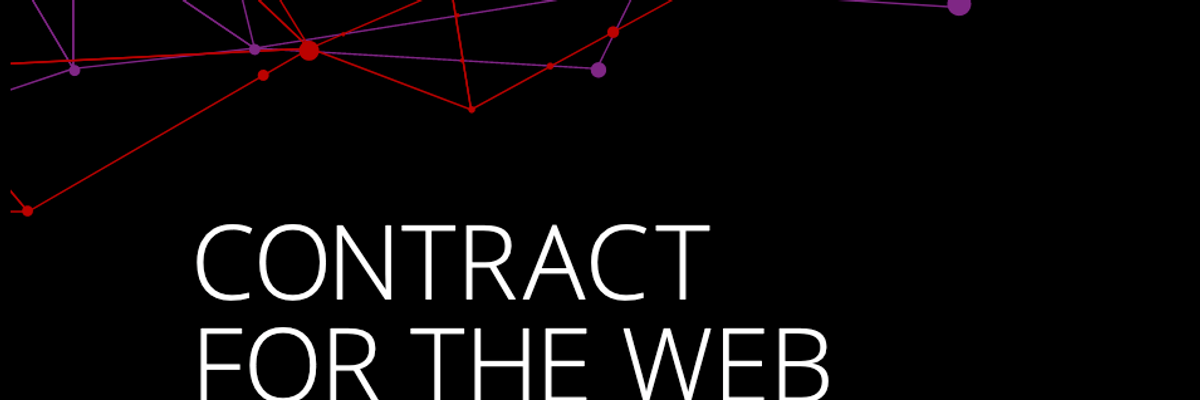Along with allies from across the globe, Sir Tim Berners-Lee--the computer engineer credited with inventing the world wide web--has unveiled a new global plan designed to restore and enshrine some of the key principles of the revolutionary technology that he and his colleagues believe have been subsumed by government censorship and surveillance as well as a rapacious corporate appetite for endless data, monetization, and profit.
"Only through real commitment and concrete action from all members of the internet community--especially governments and companies--will we make the necessary reforms to put people and rights back at the center of the internet."
--Brett Solomon, Access NowCalled the 'Contract for the Web,' the project sets out a bold set of principles designed to save the web from the forces that have stolen its potential and in many cases turned the technology's powers against the very people and institutions it was intended to serve.
"The Web was designed to bring people together and make knowledge freely available. It has changed the world for good and improved the lives of billions," reads a statement on the project's homepage. "Yet, many people are still unable to access its benefits and, for others, the Web comes with too many unacceptable costs."
A vision put forth by 80 organizations, representing governments, companies and civil society from around the world, explained Berners-Lee in a New York Times op-ed that the Contract for the Web is "a global plan of action created over the past year by activists, academics, companies, governments and citizens from across the world to make sure our online world is safe, empowering and genuinely for everyone."
In the Times, he wrote:
I had hoped that 30 years from its creation, we would be using the web foremost for the purpose of serving humanity. Projects like Wikipedia, OpenStreetMap and the world of open source software are the kinds of constructive tools that I hoped would flow from the web.
However, the reality is much more complex. Communities are being ripped apart as prejudice, hate and disinformation are peddled online. Scammers use the web to steal identities, stalkers use it to harass and intimidate their victims, and bad actors subvert democracy using clever digital tactics. The use of targeted political ads in the United States' 2020 presidential campaign and in elections elsewhere threatens once again to undermine voters' understanding and choices.
If it is to be saved, he warned, the web "needs radical intervention from all those who have power over its future."
"We're at a tipping point," he continued. "How we respond to this abuse will determine whether the web lives up to its potential as a global force for good or leads us into a digital dystopia."
In a statement announcing the project's launch, Berners-Lee said: "The power of the web to transform people's lives, enrich society and reduce inequality is one of the defining opportunities of our time. But if we don't act now--and act together--to prevent the web being misused by those who want to exploit, divide and undermine, we are at risk of squandering that potential."
The Contract itself is based on 9 core principles--3 aimed at governments; 3 at companies; and 3 at citizens--which are:
Governments
1. Ensure everyone can connect to the internet
2. Keep all of the internet available, all of the time
3. Respect and protect peoples fundamental online privacy and data rights
Companies
4. Make the internet affordable and accessible to everyone
5. Respect and protect people's privacy and personal data to build online trust
6. Develop technologies that support the best in humanity and challenge the worst
Citizens
7. Be creators and collaborators on the Web
8. Build strong communities that respect civil discourse and human dignity
9. Fight for the Web
"Only through real commitment and concrete action from all members of the internet community--especially governments and companies--will we make the necessary reforms to put people and rights back at the center of the internet," said Brett Solomon, executive director of the international digital rights group Access Now, which participated in the project.
While the website allows both individuals and organizations to endorse the set of principles, the Contract for the Web--led by Berners-Lee's World Wide Web Foundation--confirmed that the project launched with the backing of over 160 organizations and companies from around the world, including Microsoft, Google, Electronic Frontier Foundation, DuckDuckGo, CIPESA, Access Now, Reddit, Facebook, Reporters Without Borders and Ranking Digital Rights. In addition, thousands of individuals, hundreds of organizations and the governments of Germany, France and Ghana all signed up to endorse its founding principles.
"The contract is already being used to inform policy decisions, as a best-practice guide for government and company officials, and as a tool to help civil society advocate change, measure progress and hold governments and companies accountable," wrote Berners-Lee in his Times op-ed.
While a positive sign, he added, simply endorsing the principles will not be enough.
"Our World Wide Web Foundation, together with its global partners, will work to mobilize people around the world," he said. "As elections approach, raise these issues with your political representatives and candidates. The best way to change the priorities and actions of those in power is to speak up."




